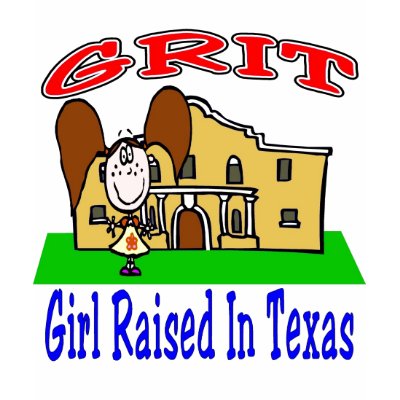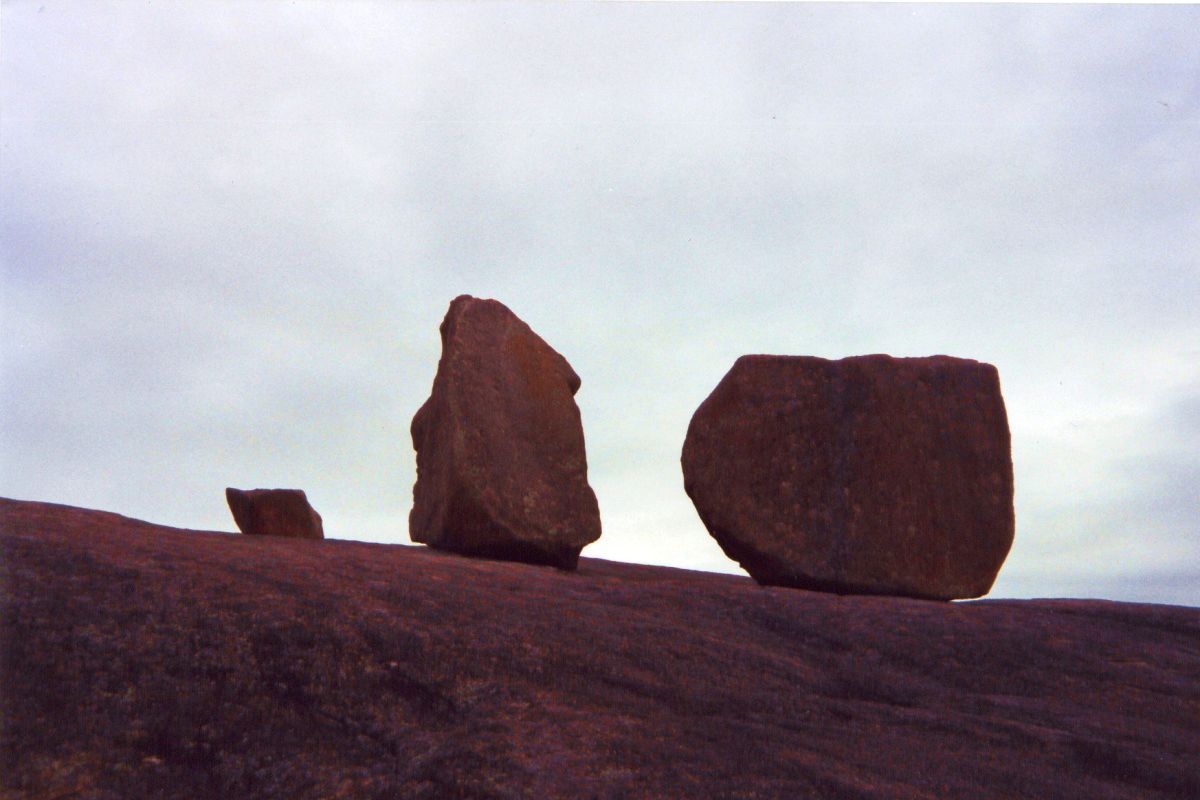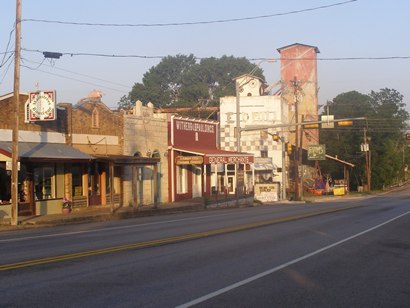Blue Highways: Grit, Texas
Unfolding the Map
Click on Thumbnail for MapWilliam Least Heat-Moon (LHM), with his temporary companion Porfirio Sanchez riding shotgun and us unseen in the back of Ghost Dancing, turns west into the long open stretches of Texas after making a passing mention to Grit. We'll linger for a moment to reflect on grit and grittiness. Click on the map thumbnail to place Grit on your mental map.
Book Quote
"At Grit, we turned west onto route 29, a road that struck a bold, narrow course straight into the heart of the Texas desert....
"The land was fenceposts and scrubby plants and not many of those. Mostly the acres were for the goats that produced the big crop here: mohair. It was the country of the San Saba River..."
Blue Highways: Part 4, Chapter 7
 I couldn't find a photo of Grit, Texas. Here's another meaning of GRIT that I wasn't aware of. Photo on zazzle.com. Click on photo to go to site.
I couldn't find a photo of Grit, Texas. Here's another meaning of GRIT that I wasn't aware of. Photo on zazzle.com. Click on photo to go to site.
Grit, Texas
What does one write when confronted with a small, unincorporated place like Grit, Texas. LHM clearly doesn't see need - just a passing mention when he turns onto a new road and heads straight as an arrow toward the west. But I've made it my challenge to write something based on the impressions I get from the places LHM cites in Blue Highways. Occasionally, I'll put a few of them together in a post if they are very small, and are near each other geographically. LHM ran a few of them together in Blue Highways - i.e. Rosepine, Anacoco, Hornbeck and Zwolle in Louisiana - and I included them all together in one post. But Grit stands out on its own, like a lot of small communities in Texas separated by many miles from one another.
The few things written about Grit seem to indicate that the townspeople wanted to call it by another name, Funston, to honor a Spanish-American war hero. Another town already had that name, so they decided to use a more earthy name to acknowledge the quality of the soil used to grow cotton in the area.
In my lexicon, grit can symbolize one of two things. The first is the soil itself. Gritty soil to me is hard, tough soil. It is loose and rough and abrasive. It is the kind of soil that doesn't hold water very well, and a strong wind can take and loft it in the air, and deposit it anywhere it likes. If you're out on a windy day, and you can taste the dirt in your mouth and when you bite down there is a little crunchiness between your teeth, that's grit. My wife's family lived in Denton, Texas for two years in the 1960s when her father was the president of what was then North Texas State University, and my wife's mother said that she could never keep the grit and dirt out of the house. It blew in through the windows and the doors. When we lived in San Antonio, every once in a while a wind would raise up a dust storm. You'd look up at the street lights and see a reddish, brown halo around them, and the air would be filled with an earthy smell. We get the same type of effect here in New Mexico when the wind kicks up, and the house can never be kept free of dirt and dust because if you live in such places, you have to share your lives with the soil you live on.
It's probably that same quality that allows us to refer to people as "gritty." One who has grit is a lot like such soil Certainly Texans have been portrayed as loose, rough and abrasive. They also have been portrayed as not holding their water very well, preferring liquor. Of course, this might seem to clash with conservative, Christian values that tend to permeate Texas society. However, there really is no clash. Imagine a town like Grit, carved out of the soil that provided its name. There was nothing there. Summers are hot, winters are cold. There's not much shade except for the trees planted by those trying to tame the land. It takes a special kind of toughness to create a sustainable and living environment in such an area. It takes a fortitude, a belief that not only is one providing for self but for a greater purpose. Family, community, and God. That is a different type of grittiness. But if we were to see a spectrum of what "grit" really means, we'd see it encompasses the whole of human nature and therefore the whole of a person. It's why cowboys in movies can be portrayed as gamblers, hard drinkers and socializers, and killers on one hand, yet also be tongue-tied around women and attend church on Sundays.
I think that if someone decided, if one day there is an epitaph written somewhere on a gravestone or some other small memorial to my life, to describe me as having grit, I would take that as a huge compliment. It would mean that I was a full person. And should my ashes be let loose into the world, or as my flesh and bones slowly broke down underground, I would become, once again, the essence of grit.
Musical interlude
I sort of outsmarted myself and put the video I should have used here in the last post. No matter. Texas is full of tough and gritty musicians that play tough and gritty music. One person that I've been introduced to in recent years is James McMurtry. If the name sounds familiar, it's because this singer-songwriter is the son of Pulitzer Prize-winning author Larry McMurtry of The Last Picture Show and Lonesome Dove fame. James has developed quite a name for himself as musician, and many of his songs are set in North and West Texas - a little bit away from where we are with LHM but appropriate nonetheless.
Levelland actually fits quite well with this post. Levelland is a small town due west of Lubbock, Texas. The portrait he provides in the song could be painted for many small towns in Texas, including Grit. Enjoy the song and video.
If you want to know more about Grit
This is about all there is. I told you it's a small place!
TexasEscapes.com: Grit
Texas State Historical Association: Grit
Next up: Eldorado, Texas




 Sunday, February 13, 2011 at 9:49AM
Sunday, February 13, 2011 at 9:49AM




